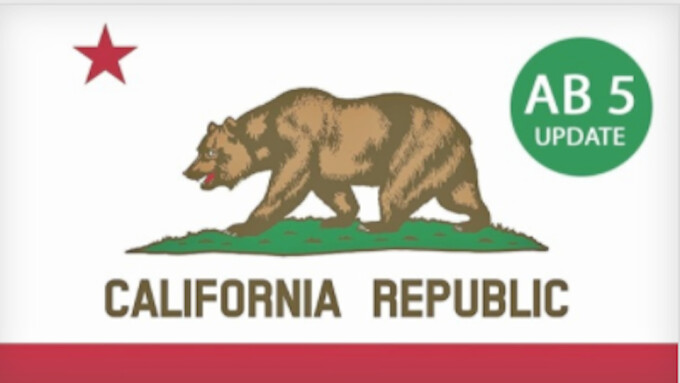SACRAMENTO — The California Senate’s Labor Committee quietly approved yesterday substantial amendments to AB2257, the so-called “clean-up bill” for the controversial AB5 legislation that altered freelance employment in the State, affecting adult performers, strip club dancers and other sex workers.
The bill had been discreetly scheduled for a vote on August 5, surprising concerned parties, as the consensus around Sacramento had been that AB5 and AB2257 were not going to see any legislative movement until 2021, due to COVID-19.
On August 6, the Senate committee passed it unanimously, but the bill underwent a series of amendments on August 7 and again yesterday, when it also passed unanimously.
The ABC Test
AB5 established the following “ABC Test” to determine if California law will consider a worker an employee or an independent contractor.
An independent contractor (aka, freelancer) must meet the following three conditions:
(A) The person is free from the control and direction of the hiring entity in connection with the performance of the work, both under the contract for the performance of the work and in fact.
(B) The person performs work that is outside the usual course of the hiring entity’s business.
(C) The person is customarily engaged in an independently established trade, occupation, or business of the same nature as that involved in the work performed.
AB2257 aims to exempt certain workers from that ABC test.
Yesterday’s changes to AB2257 (adding and detailing exemptions to AB5’s ABC test) were made throughout the bill, and they obviously reflect the legislators’ concerns about specific groups that lobbied them since the passage of AB5.
Opaque, Imprecise Language
The amendments — written in the opaque, imprecise style that characterizes rushed bills — include:
- A lengthy subsection exempting music industry freelancers — including recording artists, songwriters, lyricists, composers, managers, producers, engineers, etc. — from the ABC test
- A subsection exempting from the ABC test “film and television unit production crews, as such term is commonly used in the film and television industries, working on live or recorded performances for audiovisual works, including still photographers and cinematographers.” This section seems to apply only to music-related film crews, but the wording is vague and may be interpreted to apply to all film crews.
- Several subsections explicitly benefitting musicians’ unions.
- A subsection exempting from the ABC test “an individual performance artist presenting material that is their original work and creative in character and the result of which depends primarily on the individual’s invention, imagination, or talent, given all of the following conditions are satisfied (A) The individual is free from the control and direction of the hiring entity in connection with the performance of the work, both as a matter of contract and in fact. This includes, and is not limited to, the right for the performer to exercise artistic control over all elements of the performance; (B) The individual retains the rights to their intellectual property that was created in connection with the performance; (C) Consistent with the nature of the work, the performer sets their terms of work and has the ability to set or negotiate their rates; (D) The performer is free to accept or reject each individual performance engagement without being penalized in any form by the hiring entity."
- However, “this subdivision does not apply to an individual participating in a theatrical production, or a musician or musical group.”
- A subsection exempting providers of some “professional services” from the ABC test, including “a still photographer, photojournalist, videographer, or photo editor who works under a written contract that specifies the rate of pay and obligation to pay by a defined time, as long as the individual providing the services is not replacing an employee who performed the same amount and type of work for the hiring entity; the individual does not primarily perform the work at the hiring entity’s business location, notwithstanding subparagraph (A) of paragraph (1); and the individual is not restricted from working for more than one hiring entity. This subclause is not applicable to a still photographer, photojournalist, videographer, or photo editor who works on motion pictures, which is inclusive of, but is not limited to theatrical or commercial productions, broadcast news, television, and music videos. Nothing in this section restricts a still photographer, photojournalist, photo editor, or videographer from distributing, licensing, or selling their work product to another business, except as prohibited under copyright laws or workplace collective bargaining agreements.”
- Also exempted: those providing services “to a digital content aggregator by a still photographer, photojournalist, videographer, or photo editor.”
- Another exemption: "works by a freelance writer, translator, editor, copy editor, illustrator, or newspaper cartoonist who works under a written contract that specifies the rate of pay, intellectual property rights, and obligation to pay by a defined time, as long as the individual providing the services is not replacing an employee who performed the same amount and type of work for the hiring entity; the individual does not primarily perform the work at the hiring entity’s business location, notwithstanding subparagraph (A) of paragraph (1); and the individual is not restricted from working for more than one hiring entity."
This amended clean-up of AB5 ends with a statement about the urgency of fixing the myriad issues brought forth by Lorena Gonzalez’s supposed “Fix the Ride-Hailing Industry” legislation:
This act is an urgency statute necessary for the immediate preservation of the public peace, health, or safety within the meaning of Article IV of the California Constitution and shall go into immediate effect. The facts constituting the necessity are:
In order to ensure businesses and workers have immediate clarity on the specific standards used to determine an individual’s employment classification working in the professions impacted by this legislation, including musicians, various professionals in the music recording industry, writers, photographers, videographers, photo editors, and illustrators, and others, it is necessary for this act to take effect immediately.
Rushing to Pass the Clean-Up
On June 11, the California Assembly passed AB2257 without much fanfare.
As XBIZ reported earlier this year, “since AB5 was signed into law last September, there has been confusion and anger from many sectors of the independent contractor industry over what the bill specifically means for their job status and their ability to work as freelancers, involving everyone from Uber drivers to freelance journalists to cam models.”
Back in January, the bill’s sponsor and mastermind, California Assemblywoman Lorena Gonzalez, responded to the overwhelmingly negative reaction to AB5 by introducing AB1850, a California bill that would further clarify through legislation how employees are classified.
AB1850, after months of sustained lobbying, morphed into the AB2257 “clean-up” bill, which was supposedly still being worked on, but which earlier this month suddenly and quietly was inserted into the committee voting schedule.
Many freelancer communities — like writers, entertainers (including adult performers, cam performers and dancers) and sex workers — wishing to have their professional exemptions included in the “clean-up” bill, were blindsided by the stealthy work being done in Sacramento on AB2257 in a seeming rush to beat the national elections and the end of the year.






